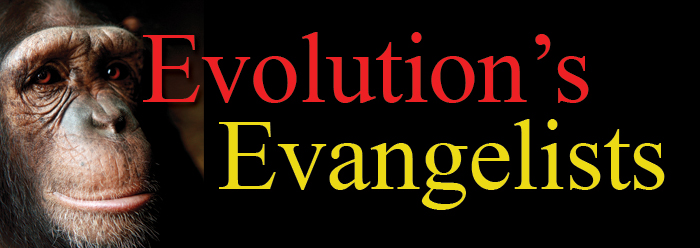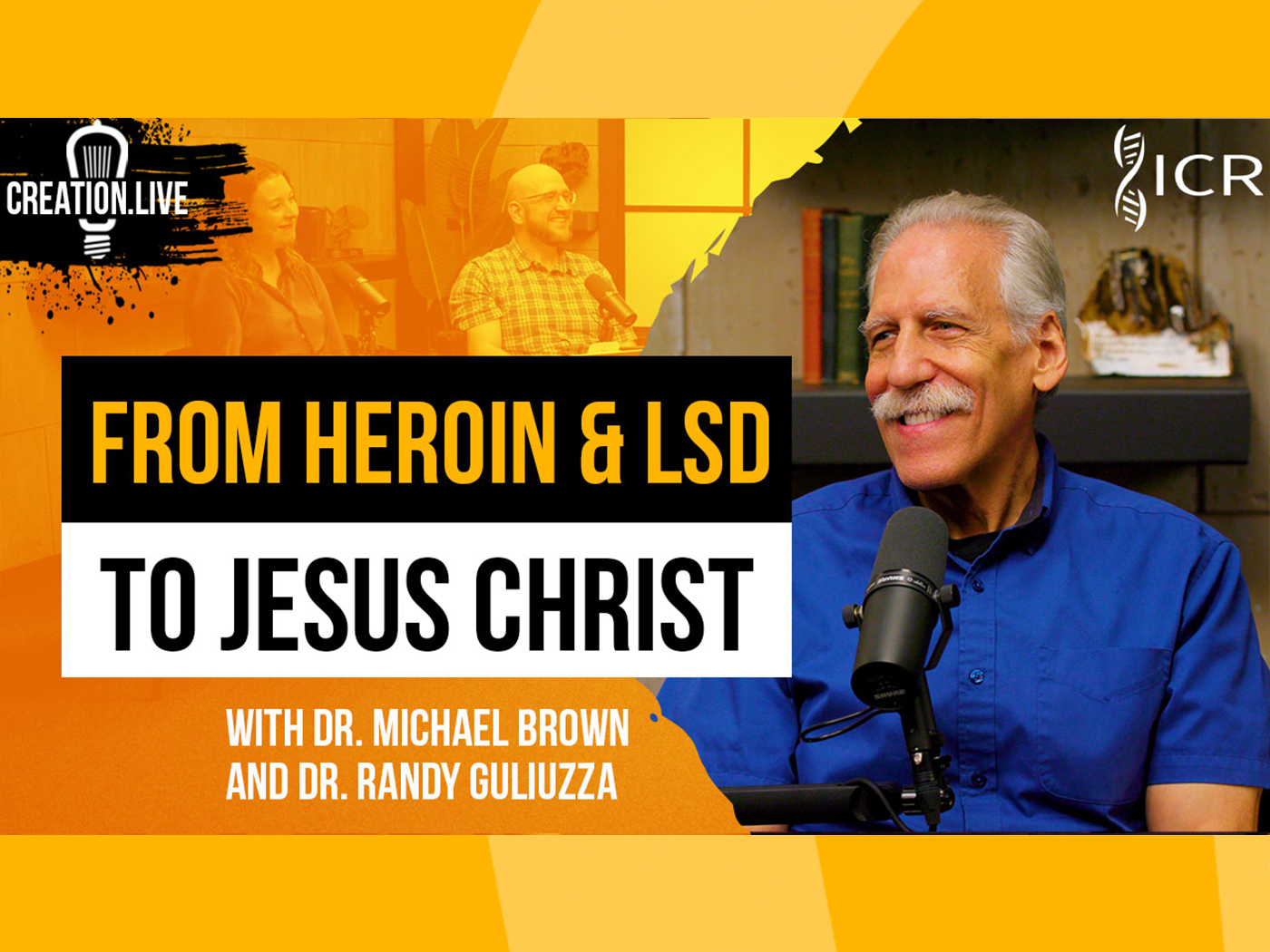"It is absolutely safe to say that, if you meet somebody who claims not to believe in evolution, that person is ignorant, stupid, or insane (or wicked, but I'd rather not consider that)."1 -- Richard Dawkins
Darwinian evolution (specifically, neo-Darwinism or the synthetic theory) has enjoyed elite status when it comes to the discussion of origins. As more is discovered about the basic components of life and how they interact, however, it has become increasingly clear that random genetic mistakes and natural selection could not possibly be biological mechanisms that over time would turn bacteria into people--i.e., simpler life forms into more complex life forms.
Neo-Darwinists often engage in a frustrating tautology, using the course of evolution to "prove" natural selection--and vice versa. If evolution were merely a scientific theory that was open to evaluation based on the evidence, then its evidentiary failings would be freely acknowledged and additional theories could be considered as they are warranted.
But far from being a free marketplace of ideas where scientists consider themselves at liberty to pursue the evidence where it leads, the modern scientific establishment has bound itself to a single system of interpretation, with myriad variations but one bottom line: evolution is fact, and alternatives must be rejected out of hand. Thus the tenets of evolution have become a matter of faith, the foundation of a worldview where random chance is the organizing principle and survival of the fittest is the highest law.
And like other systems of belief, it has its clerics (those invested as scientific authorities), its adherents (e.g., the education system and the media), its mission (to apply its "truth" to every sphere of human endeavor through research in the fields of biology, geology, cosmology, psychology, etc.)--and, of course, its heretics. Enter the evangelists of evolution, troubleshooters who step in to defend the evolutionary community from "the ignorant, the stupid, or insane." This article will take a brief look at three prominent purveyors of the evolutionary creed.
Richard Dawkins
Field of Expertise: Zoology
Education: 1962, Graduated from Balliol College, Oxford, England; 1966, M.A. and D.Phil., University of Oxford; 1989, D.Sc., University of Oxford
Current Position: Charles Simonyi Chair in the Public Understanding of Science at the University of Oxford
Dr. Dawkins has been one of the most well-known contemporary proponents of the evolutionary worldview, as well as one of the most vocal critics against opposing viewpoints. Never one to mince words, Dawkins has been called "Darwin's rottweiler"2 for his ruthless tenacity and blunt characterizations of those who dispute evolution.
Among his frank assessments is the role atheism plays in evolutionary tenets.
|A|lthough atheism might have been logically tenable before Darwin, Darwin made it possible to be an intellectually fulfilled atheist.3
The more you understand the significance of evolution, the more you are pushed away from the agnostic position and towards atheism.4
Dawkins' antipathy toward religion is summed up in the title of his 2006 book, The God Delusion. When commenting on a Gallup poll showing that nearly half of Americans believe that the universe is less than 10,000 years old, he said:
They believe this because they rate a particular bronze age origin myth more highly than all the scientific evidence in the world. It is only one of literally thousands of such myths from around the world, but it happened, by a series of historical accidents, to become enshrined in a book--Genesis.…Now, in the 21st century as we approach Darwin's bicentenary, the fact that half of Americans take Genesis literally is nothing less than an educational scandal.5
An "educational scandal," evidently, that necessitates a call to arms, a campaign to save science from the "organized ignorance" of religion and restore it to the realm of reason:
The enlightenment is under threat. So is reason. So is truth. So is science, especially in the schools of America. I am one of those scientists who feels that it is no longer enough just to get on and do science. We have to devote a significant proportion of our time and resources to defending it from deliberate attack from organized ignorance. We even have to go out on the attack ourselves, for the sake of reason and sanity. But it must be a positive attack, for science and reason have so much to give.6
What Dawkins proposes is not a faithless system. Instead of God, however, he enshrines science and reason. If something cannot currently be explained through natural means, it is only a matter of time before "miracles" will be satisfactorily transformed by science into "natural phenomena."
An atheist in this sense of philosophical naturalist is somebody who believes there is nothing beyond the natural, physical world, no supernatural creative intelligence lurking behind the observable universe, no soul that outlasts the body and no miracles--except in the sense of natural phenomena that we don't yet understand. If there is something that appears to lie beyond the natural world as it is now imperfectly understood, we hope eventually to understand it and embrace it within the natural. As ever when we unweave a rainbow, it will not become less wonderful.7
Although opposed to the view that there can or should be a Supreme Being, there is one individual to whom Dawkins has shown allegiance.
Charles Darwin showed how it is possible for blind physical forces to mimic the effects of conscious design, and, by operating as a cumulative filter of chance variations, to lead eventually to organized and adaptive complexity, to mosquitoes and mammoths, to humans and therefore, indirectly, to books and computers.8
In the world of Richard Dawkins, religion is a force of "organized ignorance" that must be actively opposed, but "blind physical forces" that "mimic…conscious design" and through random chance somehow mysteriously lead to "organized and adaptive complexity"--those are what we should trust and believe in; they are the bedrock of our world and our lives.
It is no wonder that Dawkins has elsewhere concluded that "life has no design, no purpose, no evil and no good, nothing but blind pitiless indifference."9 If this is what evolution offers, can there be any other result but despair?
Eugenie Scott
Field of Expertise: Anthropology
Education: 1967, B.S. Zoology, University of Wisconsin-Milwaukee; 1968, M.S. Zoology, University of Wisconsin-Milwaukee; 1974, Ph.D. Anthropology, University of Missouri
Current Position: Executive Director, the National Center for Science Education (NCSE)
Dr. Scott is a woman with a mission. The tagline of the NCSE website is "Defending the Teaching of Evolution in the Public Schools." Against what is she defending it? The answer is easily summed up by the titles of her recent publications Evolution vs. Creationism: An Introduction (Westport, CT: Greenwood Press, 2004) and Not in Our Classrooms: Why Intelligent Design Is Wrong for Our Schools (Boston: Beacon Press, 2006).
Like Dawkins, Scott accepts the primacy of evolution in scientific endeavors--and indeed, in society as a whole.
You can't really be scientifically literate if you don't understand evolution.…And you can't be an educated member of society if you don't understand science.10
But scientific literacy is not her primary concern, as evidenced by the "Project Steve" statement on the NCSE website:
Although there are legitimate debates about the patterns and processes of evolution, there is no serious scientific doubt that evolution occurred or that natural selection is a major mechanism in its occurrence.11
By stating that there is no "serious" scientific doubt, Scott neatly eliminates the possibility that non-evolutionary scientists can provide a valid case for their hypotheses or conclusions. This stance is presented even more strongly in her book Evolution vs. Creationism.
In principle, all scientific ideas may change, though in reality there are some scientific claims that are held with confidence, even if details may be modified. The physicist James Trefil (1978) suggested that scientific claims can be conceived as arranged in a series of three concentric circles….In the center circle are the core ideas of science: the theories and facts that we have great confidence in because they work so well to explain nature. Heliocentricism, gravitation, atomic theory, and evolution would be examples.12
When she ranks evolution as one of the "core ideas of science," Scott grants it the same legitimacy as the studies conducted on gravity and atomic theory-- although these involve testable phenomena, whereas there has been no observable scientific evidence for macroevolution.13 Yet Scott sees no contradiction:
Science is quintessentially an open-ended procedure in which ideas are constantly tested, and rejected or modified. Dogma--an idea held by belief or faith--is anathema to science.14
Evolutionists may need a refresher course on the basic definitions of "science" and "dogma." Or better yet, an accurate mirror in which to view themselves.15
Paul Zachary "P. Z." Myers
Field of Expertise: Biology
Education: 1979, B.S. Zoology, University of Washington, Seattle, WA; 1985, Ph.D. Biology, Institute of Neuroscience, University of Oregon, Eugene, OR
Current Position: Associate Professor of Biology, University of Minnesota, Morris
Although many other evolutionists are active "evangelists" in the world today, P. Z. Myers deserves a mention because of his prolific presence in cyberspace, mainly through blogs on his website Pharyngula.16 Many of his postings are surprisingly puerile, often registering on the observational level of a newly-hormonal teenager. One such posting will suffice to give the general tone.
I would think the concerted and largely successful effort in our culture to equate Christianity with the idiocy of belief in a 6000 year old world or a god who meddles in trivialities or denying the facts of a natural world would p*** you off. Unless it's true, that is, that you don't mind having your religious beliefs associated with flaming anti-scientific lunacy.
Maybe you should try squawking a little louder. You could start by writing to David Bracklin and letting him know that stupidity isn't supposed to be a Christian sacrament.
Unless it is, of course. I wouldn't know. Atheist, remember? All I know is what I see, the stuff the loudest of you bray out in public, and boy, you Christians sure seem to hate good science.17
ICR also comes in for a special mention.
The Institute for Creation Research is a treasure trove of sloppy pseudoscience.18
The Internet has opened new avenues for research and for offering data of all kinds…as well as misinformation of all kinds. As was indicated in the October 2007 Acts & Facts, web surfers must be wary of "half-truths and hidden assumptions"19 on the sites that they visit.
Although using cruder language, Myers basically offers nothing new to the debate. He may state his case more brusquely than other evolutionists, but the argument essentially remains the same--evolution is fact, evolution vs. creationism is a case of science vs. religion, science and religion are anathema to each other, therefore scientific creationism should be banished to the lunatic fringe.
No matter where the evidence leads.
References
- Dawkins, R. April 9, 1989. Book Review of Donald Johanson and Maitland Edey's Blueprint. The New York Times. Section 7, 34.
- An epithet attributed to Oxford theologian Alister McGrath in Hall, S. September 2005. Darwin's Rottweiler. Discover.
- Dawkins, R. 1996. The Blind Watchmaker. New York: Norton, 6.
- Dawkins, R. December 1994. On Debating Religion. The Nullifidian.
- Dawkins, R. Mission Statement for Both Charities. www.richarddawkinsfoundation.org (accessed April 4, 2008).
- Ibid.
- Dawkins, R. 2006. The God Delusion. Boston: Houghton Mifflin Co., 35.
- Dawkins, R. 1982. The Necessity of Darwinism. New Scientist. 94 (1301):130.
- Scheff, Liam, 2007. The Dawkins Delusion. Salvo. 2:94.
- Scott, E. February 7, 2003. Quoted in Lam, M. Profile, Eugenie Scott: Berkeley Scientist Leads Fight to Stop Teaching of Creationism. San Francisco Chronicle.
- NCSE solicits the signatures of scientists named Steve who agree with an online statement supporting evolution. See the Project Steve page at www.ncseweb.org (accessed April 14, 2008).
- Scott, E. 2004. Evolution vs. Creationism: An Introduction. Westport, CT: Greenwood Press, 8.
- See Morris, H. 2000 and 2001. The Scientific Case against Evolution, Parts 1 & 2. Acts & Facts. 28 (12) and 29 (1).
- Scott, Evolution vs. Creationism, 8.
- See James 1:23-24.
- Currently located at scienceblogs.com/pharyngula. Pharyngula refers to a stage in embryonic development in which all vertebrates appear to have similar features.
- Comment posted by PZ Myers to Pharyngula blog on April 3, 2008, 8:33 a.m.
- Comment posted by PZ Myers to Pharyngula blog on April 2, 2008, 9:14 a.m.
- The Internet Battleground. Acts & Facts. 36 (10).
Cite this article: 2008. Evolution's Evangelists. Acts & Facts. 37 (5): 10.

















